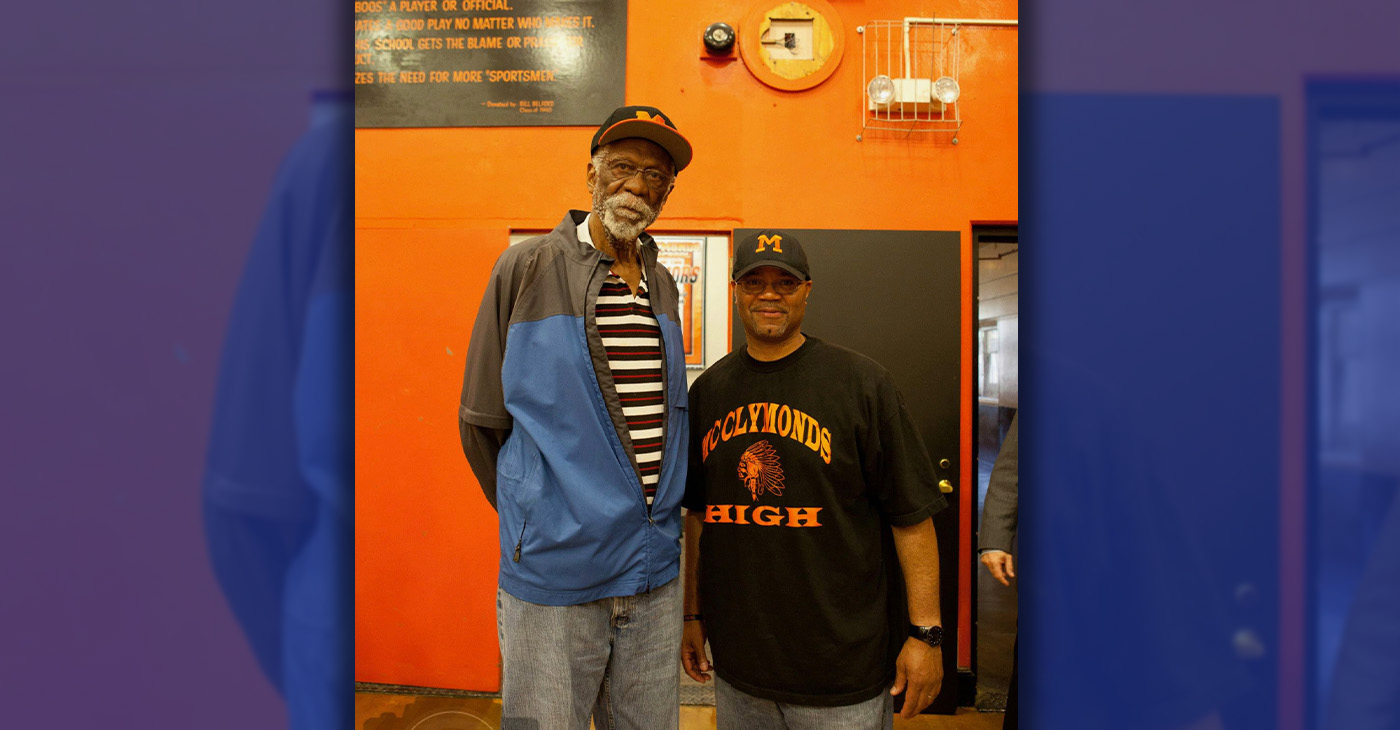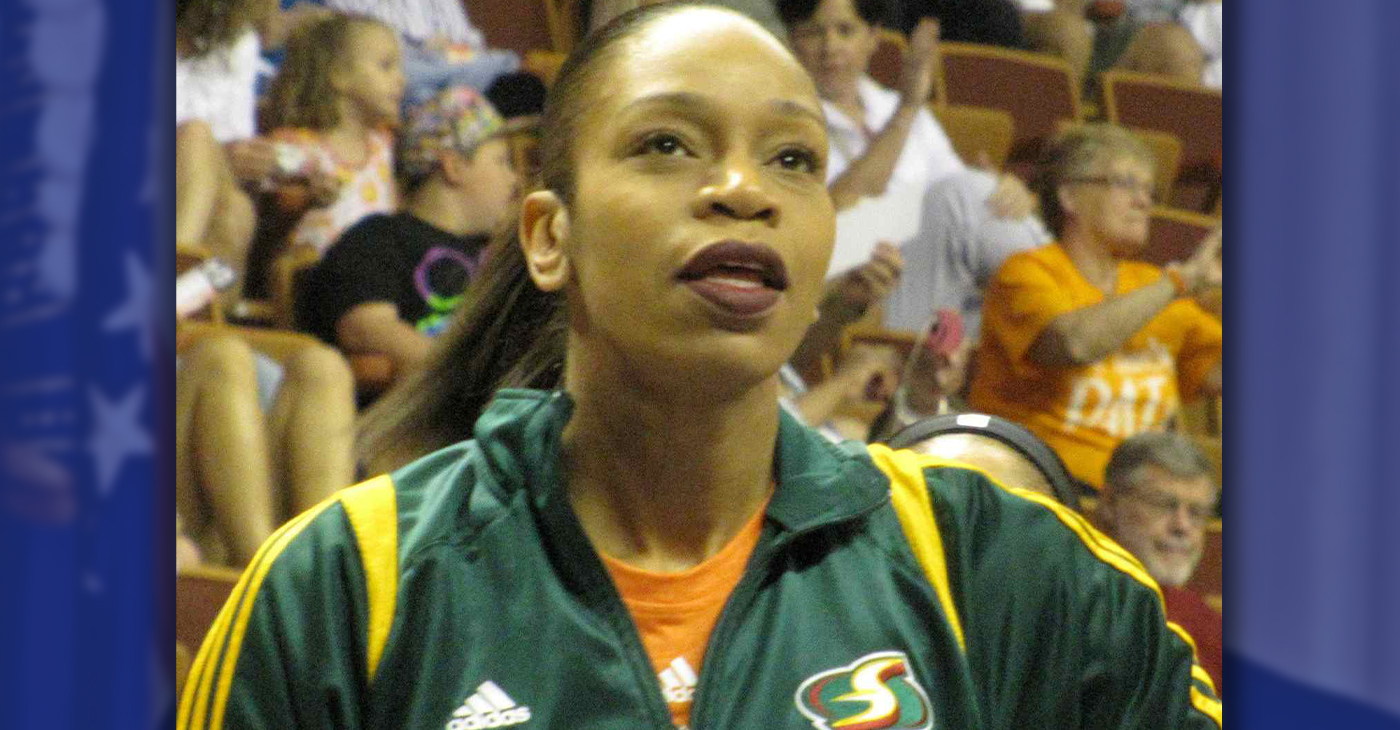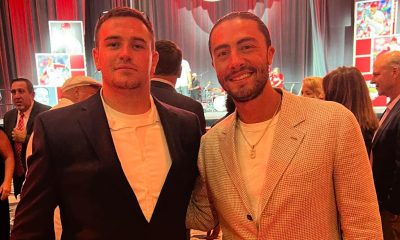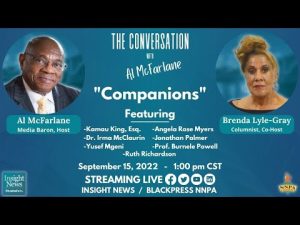Sports
Feds End Prosecution of Barry Bonds Without Conviction

In this Thursday, June 23, 2011, file photo, former San Francisco Giants slugger Barry Bonds arrives for a hearing about his perjury trial at the federal courthouse in San Francisco. The U.S. Department of Justice formally dropped its criminal prosecution of Barry Bonds, Major League Baseball’s career home run leader. (AP Photo/Paul Sakuma, File)
PAUL ELIAS, Associated Press
SUDHIN THANAWALA, Associated Press
SAN FRANCISCO (AP) — After a nearly decade-long steroids prosecution, Barry Bonds emerged victorious Tuesday when federal prosecutors dropped what was left of their criminal case against the career home runs leader.
The government’s pursuit of Bonds ended quietly with a one-paragraph motion by the U.S. Department of Justice announcing Solicitor General Donald B. Verrilli Jr. will not ask the U.S. Supreme Court to review the appellate decision that overturned Bonds’ obstruction of justice conviction.
A jury found the former San Francisco Giants star guilty in 2011 for giving a meandering answer to a federal grand jury in 2003 when asked whether his personal trainer gave him anything that required a syringe for self-injection. An 11-judge panel of the 9th U.S. Circuit Court of Appeals overturned that conviction in April, and the government had until Wednesday to file for a Supreme Court review.
The jury deadlocked on three counts accusing Bonds of making false statements when he denied receiving steroids or human growth hormone or any substance that required a syringe for self-injection from the trainer, Greg Anderson. The government dismissed those counts in August 2011, and the 9th Circuit barred a retrial on the obstruction charge, citing double jeopardy.
“The finality of today’s decision gives me great peace,” Bonds, who turns 51 on Friday, said in a statement. “As I have said before, this outcome is something I have long wished for. I am relieved, humbled and thankful for what this means for me and my family moving forward.”
Major League Baseball had no immediate comment. The U.S. Attorney’s office in San Francisco didn’t immediately respond to a phone call seeking comment.
Bonds’ legal victory is unlikely to win over critics who concluded he cheated by using performance-enhancing drugs, or help him with Hall of Fame voters.
In his third year on the Hall ballot in 2015, Bonds received 202 votes for 36.8 percent from the Baseball Writers’ Association of America. A player must garner at least 75 percent of the vote to be elected.
But it brings to a close one of the most high-profile prosecutions to emerge from an investigation of the Bay Area Laboratory Co-Operative that began in 2002 and saw the convictions of Olympic track gold medalist Marion Jones, elite sprint cyclist Tammy Thomas and former NFL defensive lineman Dana Stubblefield along with coaches, distributors, a trainer, a chemist and a lawyer.
“It seems that the government has finally come to their senses,” BALCO founder Victor Conte, who was sentenced to four months in prison and four months of home confinement, said in a statement. “In my opinion they should have never brought charges against Barry Bonds and wasted tens of millions of taxpayer dollars. … The Bonds case was simply a trophy-hunting expedition by these federal agents and prosecutors, and I believe they need to be held accountable for this waste of federal funds.”
William Portanova, a former federal prosecutor now in private practice, disagreed, saying the prosecution acted as a deterrent despite the lack of a conviction. “There’s no question that the world paid attention to this case, so win, lose or draw, any potential steroid abusers saw that there’s a chance of getting tangled in the court system,” he said.
The BALCO investigation also helped lead to the report by former Senate Majority Leader George Mitchell, which called out many of baseball’s top players, including Roger Clemens, for alleged steroids use. Clemens was acquitted in 2012 on all charges that he obstructed and lied to Congress in denying he used performance-enhancing drugs.
Bonds was charged four years after he testified before a grand jury after receiving a grant of immunity. Bonds didn’t dispute that he took steroids, but testified to the grand jury that Anderson told him they were flaxseed oil and arthritic balm.
After a three-week trial, Bonds was convicted for his response to the question: “Did Greg ever give you anything that required a syringe to inject yourself with?”
“That’s what keeps our friendship,” Bonds replied. “I was a celebrity child, not just in baseball by my own instincts. I became a celebrity child with a famous father. I just don’t get into other people’s business because of my father’s situation, you see.”
A three-judge panel of the 9th Circuit unanimously upheld the conviction in 2013 but the larger group of judges ruled in April that there was insufficient evidence Bonds’ answer was material to the federal investigation into sports doping.
After the 2011 conviction, U.S. District Judge Susan Illston sentenced Bonds to 30 days of home confinement, two years of probation, 250 hours of community service in youth-related activities and a $4,000 fine. Bonds served the home confinement before his conviction was overturned.
Bonds ended his career after the 2007 season with 762 homers, surpassing the record of 755 that Hank Aaron set from 1954-76. He has been more active with the Giants recently, serving as a hitting instructor at spring training, and Bonds still has the backing of Giants who played alongside him, such as two-time NL Cy Young Award winner Tim Lincecum.
“Thank you to all of you who have expressed your heartfelt wishes to me; for that, I am grateful,” Bonds said.
___
AP Baseball Writers Janie McCauley and Ronald Blum contributed to this report.
Copyright 2015 The Associated Press. All rights reserved. This material may not be published, broadcast, rewritten or redistributed.
Activism
McClymonds High Names School Gym for Star Graduate, Basketball Legend Bill Russell
William “Bill” Felton Russell was born on Feb. 12, 1934, and died on July 31, 2022. He achieved fame as a U.S. professional basketball player who played center for the Boston Celtics of the National Basketball Association (NBA) from 1956 to 1969. He was the centerpiece of the Celtics dynasty that won 11 NBA championships during his 13-year career.

By Ken Epstein
West Oakland’s McClymonds High School, “the School of Champions,” this week named the school’s gymnasium in honor of one of its most famous graduates, basketball legend Bill Russell (class of ’52).
William “Bill” Felton Russell was born on Feb. 12, 1934, and died on July 31, 2022. He achieved fame as a U.S. professional basketball player who played center for the Boston Celtics of the National Basketball Association (NBA) from 1956 to 1969. He was the centerpiece of the Celtics dynasty that won 11 NBA championships during his 13-year career.
Russell is widely known as one of the greatest basketball players of all time. In 2011, he received the Presidential Medal of Freedom, the country’s highest civil honor, from President Barack Obama for Russell’s contributions to basketball and the Civil Rights Movement.
The McClymonds’ naming ceremony was held on Wednesday, the same day as Russell’s birthday. Oakland leader Bill Patterson, a longtime friend of Russell’s, was scheduled to cut the ribbon at the reopening of the gym, which had been closed for several months for renovation. Russell’s daughter Karen was scheduled to attend the ribbon cutting.
Russell’s name and signature are now printed on the gymnasium floor.
Patterson was working at DeFremery Park when he met Russell. “I befriended him as a boy and during his years at University of San Francisco” said Patterson. “We stayed friends for the rest of his life.”
Said McClymonds Principal Darielle Davis, herself a McClymonds graduate, “We are excited to honor Bill Russell for his sports accolades and because he broke color barriers. He is part of our legacy, and legacy is really important at McClymonds.”
Brian McGhee, community schools manager at McClymonds and former football player at UC Berkeley, said that Russell meant a lot to him and others at the school. “He was a beacon of light and hope for West Oakland,” he said. “He did a lot for sports and for civil rights.”
Starting in 2018, Ben “Coach” Tapscott worked with Patterson and other McClymonds grads, community members, and former coaches to encourage the Oakland Board of Education to endorse the naming of the school gym, which finally happened recently.
“We worked hard to make this happen,” said Tapscott. “He’s an important part of McClymond’s history, along with a lot of other famous graduates,” he said.
Activism
OPINION: Politics, Football and Identity in Trump’s America
If you haven’t noticed, all Americans are engaged in an even bigger game that means so much more than the Super Bowl. Our democracy is falling apart.

By Emil Guillermo
Two Filipino American stories made headlines recently.
First, Nikko Remigio, the Filipino and African American kick returner for the Kansas City Chiefs, did not win Super Bowl LIX.
The other, Alameda’s Rob Bonta said no to running for governor. I don’t blame him. It’s not like a mass of people wanted him to run.
But I did.
Whenever there is a Filipino American in a place you don’t expect, I’m rooting for that person.
As California’s Attorney General, Bonta is probably the most active defender among Blue States pushing back against Trump’s Extreme-Right agenda.
I’d like to Bonta run for California’s top job, but he’s better off waiting in line. The Democrats need a spot for Kamala Harris, and Bonta not running obliges the hierarchy.
History can wait. Bonta’s just 52.
Harris has held off speculation of her next move, saying she just moved back to the state. But it seems governor is the path for her.
For now, Bonta needs to continue taking the fight to Trump in the courts.
Football and Identity Politics
My dad, whose birthday would have been Super Bowl weekend, came to the US in 1928 as a colonized Filipino, an “American National,” where he couldn’t be a citizen, vote, own property or even marry the person he wanted.
Not if they were White.
Still, he believed in America. He never gave up.
Sort of like Nikko Remigio.
My dad would have loved Nikko.
If you haven’t noticed, all Americans are engaged in an even bigger game that means so much more than the Super Bowl. Our democracy is falling apart.
You want to get passionate about Eagles and Chiefs?
Let’s be passionate about our Founding Fathers, too.
Nikko didn’t change the game. He touched it three times and provided more yards than all of KC’s running backs.
That’s all I needed to see.
He’s our Filipino guy.
Detractors may call it “identity politics.”
People don’t seem to understand the fight for visibility. To be recognized. To be seen. It’s all wrapped up in the big idea of Civil Rights.
I was nowhere near as good as Nikko when I played. But when you are blessed to play football, you play your hardest.
For me, that was when I was 12 and 13 playing Pop Warner football in San Francisco. I was MVP for my team as a running back.
But I was ashamed of my dad. He wasn’t like the other dads. And I remember going to the team banquet to retrieve my trophy alone.
I didn’t realize it probably meant more to him than I thought.
I wish I had shared my MVP moment with him like Nikko shared his joy with his dad, Mark, born in Seattle to two Filipino immigrants, and his mom, whose mixture of Black and White made Nikko the picture of diversity.
Filipino American and Black and White at the Super Bowl.
But don’t forget, there is one game bigger.
The Super Bowl for Democracy. We’re battling for it every day Trump pushes a cockamamie idea that shakes the foundation of our Democracy.
About the Author
Emil Guillermo is an award-winning journalist and commentator. Watch his micro-talk show “Emil Amok’s Takeout/What Does an Asian American Think?” on www.YouTube.com/emilamok1 Or join him on http://www.patreon.com/emilamok
Bay Area
Tina Thompson: Champion, Legend, and Pioneer of Women’s Basketball
Known for her signature red lipstick, Thompson displayed confidence and style on the court, becoming an icon both for her gameplay and her individuality. Her ability to score from anywhere on the floor, combined with her defensive prowess, made her one of the league’s most formidable players.

By Tamara Shiloh
The establishment of the Women’s National Basketball Association (WNBA) in 1996 was a turning point for women’s sports, creating a professional platform for female basketball players to showcase their skills at the highest level. Among the trailblazers who helped launch the league, Tina Thompson stands out as the first African American woman drafted into the WNBA.
Tina Thompson was born on February 10, 1975, in Los Angeles, California. Raised in a basketball-loving household, she quickly developed a passion for the game. Thompson improved her skills on the playgrounds of South Central Los Angeles, often playing against boys, which toughened her game and fueled her competitive edge.
She attended the University of Southern California (USC), where she became a standout player for the Trojans. Known for her versatility, scoring ability, and relentless work ethic, she earned All-Pac-10 honors multiple times and cemented her reputation as one of the top collegiate players in the nation.
When the WNBA held its first-ever draft on April 28, 1997, Tina Thompson made history as the league’s first African American player to be drafted. Selected as the first overall pick by the Houston Comets, she joined a team that would go on to dominate the early years of the WNBA.
Tina’s selection was a historic moment, symbolizing the league’s commitment to showcasing diverse talent. As a Black woman in a pioneering role, Thompson carried the hopes of aspiring African American female athletes who dreamed of playing professional basketball.
Tina wasted no time making an impact in the WNBA. As a key member of the Houston Comets alongside legends Cynthia Cooper and Sheryl Swoopes, she helped lead the team to an unprecedented four consecutive championships from 1997 to 2000. The Comets’ dynasty became the gold standard for excellence in the league’s early years.
Known for her signature red lipstick, Thompson displayed confidence and style on the court, becoming an icon both for her gameplay and her individuality. Her ability to score from anywhere on the floor, combined with her defensive prowess, made her one of the league’s most formidable players.
Over a career spanning 17 seasons, Tina established herself as one of the WNBA’s all-time greats. She retired as the league’s leading scorer, a record she held until it was broken by Diana Taurasi. She was a nine-time WNBA All-Star and was named to multiple All-WNBA teams, cementing her status as one of the sport’s legends.
In 2018, Thompson’s contributions to basketball were recognized with her induction into the Naismith Memorial Basketball Hall of Fame. The honor underscored her influence not just as a player, but as a trailblazer for African American women in sports.
After retiring from professional basketball, she transitioned into coaching, using her experience and knowledge to mentor young athletes. She has served as a head coach at the collegiate level, inspiring the next generation of players to pursue excellence both on and off the court.
As a role model and advocate, Thompson has consistently emphasized the importance of education, empowerment, and self-belief. Her story resonates with countless young women who see in her the embodiment of perseverance and success.
Tina Thompson is presently in her third season as an assistant coach at the University of Texas at Austin.
-

 #NNPA BlackPress4 weeks ago
#NNPA BlackPress4 weeks agoTarget Takes a Hit: $12.4 Billion Wiped Out as Boycotts Grow
-

 Activism4 weeks ago
Activism4 weeks agoUndocumented Workers Are Struggling to Feed Themselves. Slashed Budgets and New Immigration Policies Bring Fresh Challenges
-

 #NNPA BlackPress4 weeks ago
#NNPA BlackPress4 weeks agoBREAKING Groundbreaking Singer Angie Stone Dies in Car Accident at 63
-

 Arts and Culture4 weeks ago
Arts and Culture4 weeks agoBeverly Lorraine Greene: A Pioneering Architect and Symbol of Possibility and Progress
-

 Activism3 weeks ago
Activism3 weeks agoOakland Post: Week of March 5 – 11, 2025
-

 #NNPA BlackPress1 week ago
#NNPA BlackPress1 week agoRev. Dr. Jamal Bryant’s Black Church Target Boycott Mobilizes 150,000
-

 #NNPA BlackPress4 weeks ago
#NNPA BlackPress4 weeks agoTrump Moves to Dismantle Education Department
-

 #NNPA BlackPress3 weeks ago
#NNPA BlackPress3 weeks agoFighting to Keep Blackness
Sports
Feds End Prosecution of Barry Bonds Without Conviction

In this Thursday, June 23, 2011, file photo, former San Francisco Giants slugger Barry Bonds arrives for a hearing about his perjury trial at the federal courthouse in San Francisco. The U.S. Department of Justice formally dropped its criminal prosecution of Barry Bonds, Major League Baseball’s career home run leader. (AP Photo/Paul Sakuma, File)
PAUL ELIAS, Associated Press
SUDHIN THANAWALA, Associated Press
SAN FRANCISCO (AP) — After a nearly decade-long steroids prosecution, Barry Bonds emerged victorious Tuesday when federal prosecutors dropped what was left of their criminal case against the career home runs leader.
The government’s pursuit of Bonds ended quietly with a one-paragraph motion by the U.S. Department of Justice announcing Solicitor General Donald B. Verrilli Jr. will not ask the U.S. Supreme Court to review the appellate decision that overturned Bonds’ obstruction of justice conviction.
A jury found the former San Francisco Giants star guilty in 2011 for giving a meandering answer to a federal grand jury in 2003 when asked whether his personal trainer gave him anything that required a syringe for self-injection. An 11-judge panel of the 9th U.S. Circuit Court of Appeals overturned that conviction in April, and the government had until Wednesday to file for a Supreme Court review.
The jury deadlocked on three counts accusing Bonds of making false statements when he denied receiving steroids or human growth hormone or any substance that required a syringe for self-injection from the trainer, Greg Anderson. The government dismissed those counts in August 2011, and the 9th Circuit barred a retrial on the obstruction charge, citing double jeopardy.
“The finality of today’s decision gives me great peace,” Bonds, who turns 51 on Friday, said in a statement. “As I have said before, this outcome is something I have long wished for. I am relieved, humbled and thankful for what this means for me and my family moving forward.”
Major League Baseball had no immediate comment. The U.S. Attorney’s office in San Francisco didn’t immediately respond to a phone call seeking comment.
Bonds’ legal victory is unlikely to win over critics who concluded he cheated by using performance-enhancing drugs, or help him with Hall of Fame voters.
In his third year on the Hall ballot in 2015, Bonds received 202 votes for 36.8 percent from the Baseball Writers’ Association of America. A player must garner at least 75 percent of the vote to be elected.
But it brings to a close one of the most high-profile prosecutions to emerge from an investigation of the Bay Area Laboratory Co-Operative that began in 2002 and saw the convictions of Olympic track gold medalist Marion Jones, elite sprint cyclist Tammy Thomas and former NFL defensive lineman Dana Stubblefield along with coaches, distributors, a trainer, a chemist and a lawyer.
“It seems that the government has finally come to their senses,” BALCO founder Victor Conte, who was sentenced to four months in prison and four months of home confinement, said in a statement. “In my opinion they should have never brought charges against Barry Bonds and wasted tens of millions of taxpayer dollars. … The Bonds case was simply a trophy-hunting expedition by these federal agents and prosecutors, and I believe they need to be held accountable for this waste of federal funds.”
William Portanova, a former federal prosecutor now in private practice, disagreed, saying the prosecution acted as a deterrent despite the lack of a conviction. “There’s no question that the world paid attention to this case, so win, lose or draw, any potential steroid abusers saw that there’s a chance of getting tangled in the court system,” he said.
The BALCO investigation also helped lead to the report by former Senate Majority Leader George Mitchell, which called out many of baseball’s top players, including Roger Clemens, for alleged steroids use. Clemens was acquitted in 2012 on all charges that he obstructed and lied to Congress in denying he used performance-enhancing drugs.
Bonds was charged four years after he testified before a grand jury after receiving a grant of immunity. Bonds didn’t dispute that he took steroids, but testified to the grand jury that Anderson told him they were flaxseed oil and arthritic balm.
After a three-week trial, Bonds was convicted for his response to the question: “Did Greg ever give you anything that required a syringe to inject yourself with?”
“That’s what keeps our friendship,” Bonds replied. “I was a celebrity child, not just in baseball by my own instincts. I became a celebrity child with a famous father. I just don’t get into other people’s business because of my father’s situation, you see.”
A three-judge panel of the 9th Circuit unanimously upheld the conviction in 2013 but the larger group of judges ruled in April that there was insufficient evidence Bonds’ answer was material to the federal investigation into sports doping.
After the 2011 conviction, U.S. District Judge Susan Illston sentenced Bonds to 30 days of home confinement, two years of probation, 250 hours of community service in youth-related activities and a $4,000 fine. Bonds served the home confinement before his conviction was overturned.
Bonds ended his career after the 2007 season with 762 homers, surpassing the record of 755 that Hank Aaron set from 1954-76. He has been more active with the Giants recently, serving as a hitting instructor at spring training, and Bonds still has the backing of Giants who played alongside him, such as two-time NL Cy Young Award winner Tim Lincecum.
“Thank you to all of you who have expressed your heartfelt wishes to me; for that, I am grateful,” Bonds said.
___
AP Baseball Writers Janie McCauley and Ronald Blum contributed to this report.
Copyright 2015 The Associated Press. All rights reserved. This material may not be published, broadcast, rewritten or redistributed.
Activism
McClymonds High Names School Gym for Star Graduate, Basketball Legend Bill Russell
William “Bill” Felton Russell was born on Feb. 12, 1934, and died on July 31, 2022. He achieved fame as a U.S. professional basketball player who played center for the Boston Celtics of the National Basketball Association (NBA) from 1956 to 1969. He was the centerpiece of the Celtics dynasty that won 11 NBA championships during his 13-year career.

By Ken Epstein
West Oakland’s McClymonds High School, “the School of Champions,” this week named the school’s gymnasium in honor of one of its most famous graduates, basketball legend Bill Russell (class of ’52).
William “Bill” Felton Russell was born on Feb. 12, 1934, and died on July 31, 2022. He achieved fame as a U.S. professional basketball player who played center for the Boston Celtics of the National Basketball Association (NBA) from 1956 to 1969. He was the centerpiece of the Celtics dynasty that won 11 NBA championships during his 13-year career.
Russell is widely known as one of the greatest basketball players of all time. In 2011, he received the Presidential Medal of Freedom, the country’s highest civil honor, from President Barack Obama for Russell’s contributions to basketball and the Civil Rights Movement.
The McClymonds’ naming ceremony was held on Wednesday, the same day as Russell’s birthday. Oakland leader Bill Patterson, a longtime friend of Russell’s, was scheduled to cut the ribbon at the reopening of the gym, which had been closed for several months for renovation. Russell’s daughter Karen was scheduled to attend the ribbon cutting.
Russell’s name and signature are now printed on the gymnasium floor.
Patterson was working at DeFremery Park when he met Russell. “I befriended him as a boy and during his years at University of San Francisco” said Patterson. “We stayed friends for the rest of his life.”
Said McClymonds Principal Darielle Davis, herself a McClymonds graduate, “We are excited to honor Bill Russell for his sports accolades and because he broke color barriers. He is part of our legacy, and legacy is really important at McClymonds.”
Brian McGhee, community schools manager at McClymonds and former football player at UC Berkeley, said that Russell meant a lot to him and others at the school. “He was a beacon of light and hope for West Oakland,” he said. “He did a lot for sports and for civil rights.”
Starting in 2018, Ben “Coach” Tapscott worked with Patterson and other McClymonds grads, community members, and former coaches to encourage the Oakland Board of Education to endorse the naming of the school gym, which finally happened recently.
“We worked hard to make this happen,” said Tapscott. “He’s an important part of McClymond’s history, along with a lot of other famous graduates,” he said.
Activism
OPINION: Politics, Football and Identity in Trump’s America
If you haven’t noticed, all Americans are engaged in an even bigger game that means so much more than the Super Bowl. Our democracy is falling apart.

By Emil Guillermo
Two Filipino American stories made headlines recently.
First, Nikko Remigio, the Filipino and African American kick returner for the Kansas City Chiefs, did not win Super Bowl LIX.
The other, Alameda’s Rob Bonta said no to running for governor. I don’t blame him. It’s not like a mass of people wanted him to run.
But I did.
Whenever there is a Filipino American in a place you don’t expect, I’m rooting for that person.
As California’s Attorney General, Bonta is probably the most active defender among Blue States pushing back against Trump’s Extreme-Right agenda.
I’d like to Bonta run for California’s top job, but he’s better off waiting in line. The Democrats need a spot for Kamala Harris, and Bonta not running obliges the hierarchy.
History can wait. Bonta’s just 52.
Harris has held off speculation of her next move, saying she just moved back to the state. But it seems governor is the path for her.
For now, Bonta needs to continue taking the fight to Trump in the courts.
Football and Identity Politics
My dad, whose birthday would have been Super Bowl weekend, came to the US in 1928 as a colonized Filipino, an “American National,” where he couldn’t be a citizen, vote, own property or even marry the person he wanted.
Not if they were White.
Still, he believed in America. He never gave up.
Sort of like Nikko Remigio.
My dad would have loved Nikko.
If you haven’t noticed, all Americans are engaged in an even bigger game that means so much more than the Super Bowl. Our democracy is falling apart.
You want to get passionate about Eagles and Chiefs?
Let’s be passionate about our Founding Fathers, too.
Nikko didn’t change the game. He touched it three times and provided more yards than all of KC’s running backs.
That’s all I needed to see.
He’s our Filipino guy.
Detractors may call it “identity politics.”
People don’t seem to understand the fight for visibility. To be recognized. To be seen. It’s all wrapped up in the big idea of Civil Rights.
I was nowhere near as good as Nikko when I played. But when you are blessed to play football, you play your hardest.
For me, that was when I was 12 and 13 playing Pop Warner football in San Francisco. I was MVP for my team as a running back.
But I was ashamed of my dad. He wasn’t like the other dads. And I remember going to the team banquet to retrieve my trophy alone.
I didn’t realize it probably meant more to him than I thought.
I wish I had shared my MVP moment with him like Nikko shared his joy with his dad, Mark, born in Seattle to two Filipino immigrants, and his mom, whose mixture of Black and White made Nikko the picture of diversity.
Filipino American and Black and White at the Super Bowl.
But don’t forget, there is one game bigger.
The Super Bowl for Democracy. We’re battling for it every day Trump pushes a cockamamie idea that shakes the foundation of our Democracy.
About the Author
Emil Guillermo is an award-winning journalist and commentator. Watch his micro-talk show “Emil Amok’s Takeout/What Does an Asian American Think?” on www.YouTube.com/emilamok1 Or join him on http://www.patreon.com/emilamok
Bay Area
Tina Thompson: Champion, Legend, and Pioneer of Women’s Basketball
Known for her signature red lipstick, Thompson displayed confidence and style on the court, becoming an icon both for her gameplay and her individuality. Her ability to score from anywhere on the floor, combined with her defensive prowess, made her one of the league’s most formidable players.

By Tamara Shiloh
The establishment of the Women’s National Basketball Association (WNBA) in 1996 was a turning point for women’s sports, creating a professional platform for female basketball players to showcase their skills at the highest level. Among the trailblazers who helped launch the league, Tina Thompson stands out as the first African American woman drafted into the WNBA.
Tina Thompson was born on February 10, 1975, in Los Angeles, California. Raised in a basketball-loving household, she quickly developed a passion for the game. Thompson improved her skills on the playgrounds of South Central Los Angeles, often playing against boys, which toughened her game and fueled her competitive edge.
She attended the University of Southern California (USC), where she became a standout player for the Trojans. Known for her versatility, scoring ability, and relentless work ethic, she earned All-Pac-10 honors multiple times and cemented her reputation as one of the top collegiate players in the nation.
When the WNBA held its first-ever draft on April 28, 1997, Tina Thompson made history as the league’s first African American player to be drafted. Selected as the first overall pick by the Houston Comets, she joined a team that would go on to dominate the early years of the WNBA.
Tina’s selection was a historic moment, symbolizing the league’s commitment to showcasing diverse talent. As a Black woman in a pioneering role, Thompson carried the hopes of aspiring African American female athletes who dreamed of playing professional basketball.
Tina wasted no time making an impact in the WNBA. As a key member of the Houston Comets alongside legends Cynthia Cooper and Sheryl Swoopes, she helped lead the team to an unprecedented four consecutive championships from 1997 to 2000. The Comets’ dynasty became the gold standard for excellence in the league’s early years.
Known for her signature red lipstick, Thompson displayed confidence and style on the court, becoming an icon both for her gameplay and her individuality. Her ability to score from anywhere on the floor, combined with her defensive prowess, made her one of the league’s most formidable players.
Over a career spanning 17 seasons, Tina established herself as one of the WNBA’s all-time greats. She retired as the league’s leading scorer, a record she held until it was broken by Diana Taurasi. She was a nine-time WNBA All-Star and was named to multiple All-WNBA teams, cementing her status as one of the sport’s legends.
In 2018, Thompson’s contributions to basketball were recognized with her induction into the Naismith Memorial Basketball Hall of Fame. The honor underscored her influence not just as a player, but as a trailblazer for African American women in sports.
After retiring from professional basketball, she transitioned into coaching, using her experience and knowledge to mentor young athletes. She has served as a head coach at the collegiate level, inspiring the next generation of players to pursue excellence both on and off the court.
As a role model and advocate, Thompson has consistently emphasized the importance of education, empowerment, and self-belief. Her story resonates with countless young women who see in her the embodiment of perseverance and success.
Tina Thompson is presently in her third season as an assistant coach at the University of Texas at Austin.
-

 #NNPA BlackPress4 weeks ago
#NNPA BlackPress4 weeks agoTarget Takes a Hit: $12.4 Billion Wiped Out as Boycotts Grow
-

 Activism4 weeks ago
Activism4 weeks agoUndocumented Workers Are Struggling to Feed Themselves. Slashed Budgets and New Immigration Policies Bring Fresh Challenges
-

 #NNPA BlackPress4 weeks ago
#NNPA BlackPress4 weeks agoBREAKING Groundbreaking Singer Angie Stone Dies in Car Accident at 63
-

 Arts and Culture4 weeks ago
Arts and Culture4 weeks agoBeverly Lorraine Greene: A Pioneering Architect and Symbol of Possibility and Progress
-

 Activism3 weeks ago
Activism3 weeks agoOakland Post: Week of March 5 – 11, 2025
-

 #NNPA BlackPress1 week ago
#NNPA BlackPress1 week agoRev. Dr. Jamal Bryant’s Black Church Target Boycott Mobilizes 150,000
-

 #NNPA BlackPress4 weeks ago
#NNPA BlackPress4 weeks agoTrump Moves to Dismantle Education Department
-

 #NNPA BlackPress3 weeks ago
#NNPA BlackPress3 weeks agoFighting to Keep Blackness




























































Leave a Reply